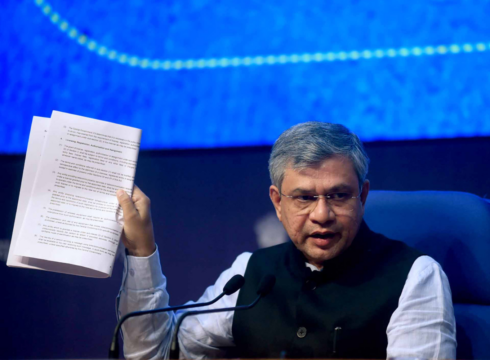The draft telecom bill won’t force decryption of messages on OTT messaging apps. The law, however, had a provision for their interception: IT Minister
It is a citizen’s right to know who is calling them, irrespective of the platforms, so that there is a choice whether to pick up the call or not…we intend to take the KYC of users seriously: Vaishnaw
The draft telecom rules are part of the larger digital regulatory overhaul undertaken by the Indian government
Inc42 Daily Brief
Stay Ahead With Daily News & Analysis on India’s Tech & Startup Economy
Communications Minister Ashwini Vaishnaw has said that the new telecom bill could be implemented as soon as the next six to ten months.
“Basis consultation process, we will create (a) final draft. That draft will then go through committee processes of Parliament. Then it has to go (to) Parliament. I see a timeline of 6-10 months but we are not in a hurry,” said Vaishnaw.
He made the comments during a media interaction on the draft telecom bill unveiled earlier this month. The Department of Telecommunications has invited feedback on the draft Bill and has set the deadline of October 20 for receiving comments.
Addressing the media, Vaishnaw said that the draft bill will provide an enabling framework for the protection of users and to fight cyber frauds.
“It is important that we look at this Bill as part of a larger comprehensive digital framework that we are trying to deliberate. We should not look at the Bill as an ultimate solution as it won’t be. This is just the first step towards a larger solution to this problem of fraud, we want to break those institutions and cycles,” he added.
The Minister also made an interesting comment at the press conference, where he said that the draft telecom bill would not force the decryption of messages on over-the-top messaging apps such as WhatsApp, Telegram and Signal. He, however, said that the proposed law had a provision for their interception.
“There is no provision to force decryption (of OTT based messaging services) … However, there is a very clear process on interception with checks and balances based on Supreme Court’s guidelines. That system will continue to be followed,” noted the Communications Minister.
Vaishnaw said that the proposed law will promote innovation with a ‘light-touch’ of regulation. Stressing on innovation, he also added that user protection would be paramount.
Giving a presentation on the recently unveiled draft telecom bill, the Minister said that it was important to ascertain the identity of callers on the other end. He further added that “know your customer” (KYC) would have to be done for all such OTT to curb instances of fraud.
“It is a citizen’s right to know who is calling them, irrespective of the platforms, so that there is a choice whether to pick up the call or not…we intend to take the KYC of users seriously,” said Vaishnaw.
Speaking about the ambit, Vaishnaw said that the proposed law would include all calls, including normal voice calls, WhatsApp calls, Facetime and other OTT calls.
This builds on the TRAI’s previous promise of developing a KYC-based caller identification service which would directly compete with apps such as Truecaller.
The draft bill seeks to replace three major laws, including the Indian Telegraph Act of 1885, the Indian Wireless Telegraphy Act of 1933 and the Telegraph Wires (Unlawful Possession) Act, 1950.
Issues Galore
This more or less follows the government’s intention to overhaul the entire digital regulatory landscape. As part of this, the government plans to unveil a host of frameworks under the Digital India Act that would address issues ranging from data protection to data governance.
In the face of an evolving digital sphere, officials claim to be working on a holistic approach towards building an ecosystem which would encompass different aspects of Indians’ digital lives. But, while the government claims that these are ways of safeguarding citizens, critics have accused the government of clamping down on dissent and free speech.
While the government has specifically claimed in Parliament that the new IT Act does not restrict freedom of speech and expression of citizens, authorities have used the same rule to ban Twitter accounts and YouTube channels.
Interestingly, even WhatsApp dragged authorities to Delhi High Court last year against the new IT Rules, citing that the new norms would force it to break its end-to-end encryption. The same plea had also argued that any attempts to decipher the identity of the caller would force the instant messaging app to decrypt calls and messages, which would essentially be an ‘invasion of privacy.’
Note: We at Inc42 take our ethics very seriously. More information about it can be found here.


